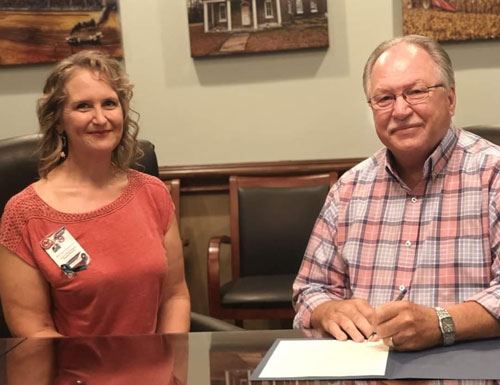County Executive T.R. Williams released an important message regarding preventing the heartbreak of suicide.

County Executive T.R Williams released the following important information regarding suicide prevention:
"Preventing the heartbreak of suicide
Even during Suicide Prevention Month, suicide is hard to talk about.
The numbers show that we should. On average, three people a day die by suicide in Tennessee, and many more attempt it. It is the state’s second-leading cause of death among people age 10-34, and the rate for 15- to 24-year-olds has increased 200% nationwide in the past 50 years. Still, people at midlife (age 45-64) are at most risk to commit suicide, and this group only recently surpassed seniors (65+) as the demographic with the highest suicide rate in Tennessee.
“Suicide does not discriminate,” says Mary Anne Christian, South Central Regional Director for the Tennessee Suicide Prevention Network (TSPN). “It cuts across ethnic, economic, social and age boundaries.”
People calling suicide hotlines now report overwhelming depression, isolation, and anxiety, she said. “All over, crises are up. But it is a positive thing that people are reaching out for help.”
Christian has worked with TSPN in our 13-county district about one year, following a career as a teacher and school administrator. “I was seeing an increase in suicidal ideation and behaviors among students. Because it is such a taboo subject, there is a great need for more training and resources. I knew there was a need for people to talk about it. That’s why I do what I do.”
Whether you are grieving a loss to suicide; worrying that a loved one might make an attempt; or contemplating it yourself, TSPN offers answers, hope, and ways to talk about the subject in three areas of focus: Prevention, Intervention, and Post-vention.
PREVENTION
Protective factors in our homes, schools, businesses, churches, and communities help prevent suicide and suicidal thoughts:
*Promotion of individual resiliency, self-esteem, direction, mission, determination, perseverance, optimism, and empathy.
*Social support, close relationships
*Respect for help-seeking behaviors
*Access to comprehensive health care
The free, hour-long TSPN training program “Question, Persuade, Refer” serves both prevention and intervention. It can be tailored to any group; the Lawrence County Substance Use Prevention Coalition recently hosted a QPR training focused on the influence of drugs and alcohol on suicide.
QPR teaches attendees how to identify warning signs and risk factors, provide assistance and listen to the person in crisis, and direct them to the help they need. It is offered live or via Zoom.
“We like to think of QPR as CPR – anyone who is CPR certified is ready to give assistance in case of emergency until a doctor or more professional help can be reached,” TSPN.org explains. “QPR is similar in the sense that although no one will walk out of a QPR training a counselor or a mental health professional, they will be able to give assistance and listen to the person in crisis until more qualified help can be rendered.”
INTERVENTION
Don’t believe three common myths about suicide:
#1: No one can stop a suicide.
Truth: If you are trained to recognize the warning signs, you can direct people to the life-saving help they need. Most suicidal people desperately want to live; they are just unable to see alternatives to their problems.
#2: If people talk about suicide, they’re not going to do it.
Truth: Talking about it means they have gone beyond the stage of thought, Christian said, and are very likely to do it. You should try to persuade them to call a national or state hotline (see accompany graphics), but you can call on their behalf and receive guidance to help them. You can also text TN741741.
#3: If you confront them it will make them angry.
Truth: Talking to a suicidal person is like lifting the lid off a pot that’s about to boil over, Christian said. Releasing the steam and heat helps the water settle and not boil over.
TSPN suggests ways to start a conversation about suicide:
• I’m concerned about you.
• Recently, I have noticed some changes in you. How are you doing?
• I wanted to check in with you because you haven’t seemed yourself lately.
Do not:
*Judge or act shocked
*Debate whether suicide is right or wrong or lecture about the value of life.
*Offer easy reassurance for problems that are complex.
No matter what:
Get help. Immediately contact a person or organization that specializes in crisis intervention or suicide prevention.
POST-VENTION
Each suicide affects approximately 143 people, Christian said, and in small communities like ours the number is much higher. A willingness to share our grief and listen to hurting people may save other lives.
“Surviving family members not only suffer the loss of a loved one, but are also themselves at higher risk of suicide and emotional problems. Friends and family members are four times more likely to commit suicide themselves.
“It’s one thing we don’t want to talk about, but we’ve got to have those conversations. It only further isolates grieving people if we don’t.” If the survivor is not talking to a counselor, or taking affected children to a counselor, please encourage them to do so.
TSPN.org offers links to online and live support groups for people considering suicide or grieving it; access to training; free printed material; help for specific populations (including veterans); and more. Another good resource for grieving children is The Dougy Center and its National Center for Grieving Children and Families, Dougy.org.
Mary Anne Christian can be reached at mchristian@tspn.org or 931-629-2746."
Photo Credit: County Executive T.R Williams

